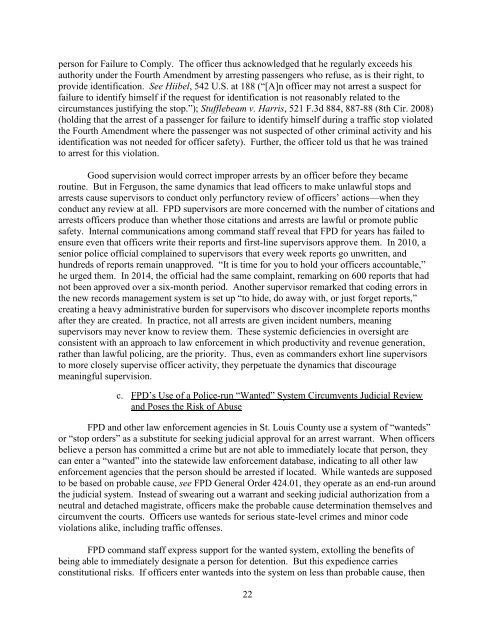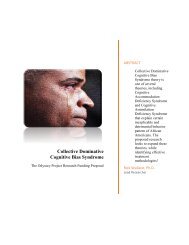U.S. Justice Department Report on the Ferguson Police Department
Ferguson’s law enforcement practices are shaped by the City’s focus on revenue rather than by public safety needs. This emphasis on revenue has compromised the institutional character of Ferguson’s police department, contributing to a pattern of unconstitutional policing, and has also shaped its municipal court, leading to procedures that raise due process concerns and inflict unnecessary harm on members of the Ferguson community.
Ferguson’s law enforcement practices are shaped by the City’s focus on revenue rather than by public safety needs. This emphasis on revenue has compromised the institutional character of Ferguson’s police department, contributing to a pattern of unconstitutional policing, and has also shaped its municipal court, leading to procedures that raise due process concerns and inflict unnecessary harm on members of the Ferguson community.
You also want an ePaper? Increase the reach of your titles
YUMPU automatically turns print PDFs into web optimized ePapers that Google loves.
pers<strong>on</strong> for Failure to Comply. The officer thus acknowledged that he regularly exceeds his<br />
authority under <strong>the</strong> Fourth Amendment by arresting passengers who refuse, as is <strong>the</strong>ir right, to<br />
provide identificati<strong>on</strong>. See Hiibel, 542 U.S. at 188 (“[A]n officer may not arrest a suspect for<br />
failure to identify himself if <strong>the</strong> request for identificati<strong>on</strong> is not reas<strong>on</strong>ably related to <strong>the</strong><br />
circumstances justifying <strong>the</strong> stop.”); Stufflebeam v. Harris, 521 F.3d 884, 887-88 (8th Cir. 2008)<br />
(holding that <strong>the</strong> arrest of a passenger for failure to identify himself during a traffic stop violated<br />
<strong>the</strong> Fourth Amendment where <strong>the</strong> passenger was not suspected of o<strong>the</strong>r criminal activity and his<br />
identificati<strong>on</strong> was not needed for officer safety). Fur<strong>the</strong>r, <strong>the</strong> officer told us that he was trained<br />
to arrest for this violati<strong>on</strong>.<br />
Good supervisi<strong>on</strong> would correct improper arrests by an officer before <strong>the</strong>y became<br />
routine. But in Fergus<strong>on</strong>, <strong>the</strong> same dynamics that lead officers to make unlawful stops and<br />
arrests cause supervisors to c<strong>on</strong>duct <strong>on</strong>ly perfunctory review of officers’ acti<strong>on</strong>s—when <strong>the</strong>y<br />
c<strong>on</strong>duct any review at all. FPD supervisors are more c<strong>on</strong>cerned with <strong>the</strong> number of citati<strong>on</strong>s and<br />
arrests officers produce than whe<strong>the</strong>r those citati<strong>on</strong>s and arrests are lawful or promote public<br />
safety. Internal communicati<strong>on</strong>s am<strong>on</strong>g command staff reveal that FPD for years has failed to<br />
ensure even that officers write <strong>the</strong>ir reports and first-line supervisors approve <strong>the</strong>m. In 2010, a<br />
senior police official complained to supervisors that every week reports go unwritten, and<br />
hundreds of reports remain unapproved. “It is time for you to hold your officers accountable,”<br />
he urged <strong>the</strong>m. In 2014, <strong>the</strong> official had <strong>the</strong> same complaint, remarking <strong>on</strong> 600 reports that had<br />
not been approved over a six-m<strong>on</strong>th period. Ano<strong>the</strong>r supervisor remarked that coding errors in<br />
<strong>the</strong> new records management system is set up “to hide, do away with, or just forget reports,”<br />
creating a heavy administrative burden for supervisors who discover incomplete reports m<strong>on</strong>ths<br />
after <strong>the</strong>y are created. In practice, not all arrests are given incident numbers, meaning<br />
supervisors may never know to review <strong>the</strong>m. These systemic deficiencies in oversight are<br />
c<strong>on</strong>sistent with an approach to law enforcement in which productivity and revenue generati<strong>on</strong>,<br />
ra<strong>the</strong>r than lawful policing, are <strong>the</strong> priority. Thus, even as commanders exhort line supervisors<br />
to more closely supervise officer activity, <strong>the</strong>y perpetuate <strong>the</strong> dynamics that discourage<br />
meaningful supervisi<strong>on</strong>.<br />
c. FPD’s Use of a <strong>Police</strong>-run “Wanted” System Circumvents Judicial Review<br />
and Poses <strong>the</strong> Risk of Abuse<br />
FPD and o<strong>the</strong>r law enforcement agencies in St. Louis County use a system of “wanteds”<br />
or “stop orders” as a substitute for seeking judicial approval for an arrest warrant. When officers<br />
believe a pers<strong>on</strong> has committed a crime but are not able to immediately locate that pers<strong>on</strong>, <strong>the</strong>y<br />
can enter a “wanted” into <strong>the</strong> statewide law enforcement database, indicating to all o<strong>the</strong>r law<br />
enforcement agencies that <strong>the</strong> pers<strong>on</strong> should be arrested if located. While wanteds are supposed<br />
to be based <strong>on</strong> probable cause, see FPD General Order 424.01, <strong>the</strong>y operate as an end-run around<br />
<strong>the</strong> judicial system. Instead of swearing out a warrant and seeking judicial authorizati<strong>on</strong> from a<br />
neutral and detached magistrate, officers make <strong>the</strong> probable cause determinati<strong>on</strong> <strong>the</strong>mselves and<br />
circumvent <strong>the</strong> courts. Officers use wanteds for serious state-level crimes and minor code<br />
violati<strong>on</strong>s alike, including traffic offenses.<br />
FPD command staff express support for <strong>the</strong> wanted system, extolling <strong>the</strong> benefits of<br />
being able to immediately designate a pers<strong>on</strong> for detenti<strong>on</strong>. But this expedience carries<br />
c<strong>on</strong>stituti<strong>on</strong>al risks. If officers enter wanteds into <strong>the</strong> system <strong>on</strong> less than probable cause, <strong>the</strong>n<br />
22

















